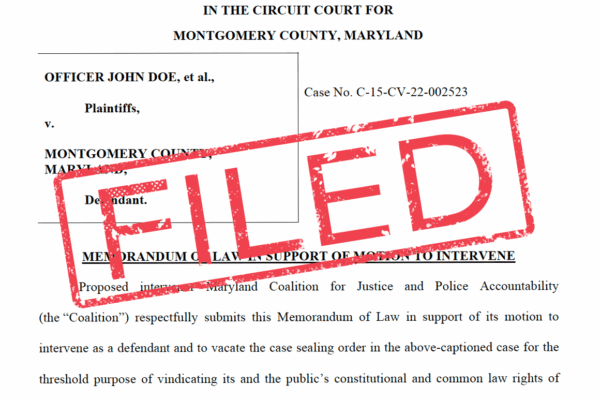Side Deal Between FOP, Montgomery County Threatens Public Access to Misconduct Records
MONTGOMERY COUNTY, MD – Acting to defend the community transparency protections at the core of Anton’s Law, the Maryland Coalition for Justice and Police Accountability (MCJPA) is moving to intervene in a dangerous legal effort by the Fraternal Order of Police Lodge 35 (FOP) in Montgomery County to block access to records of police misconduct that should be accessible to the public. MCJPA is asking the court first to unseal proceedings in the case, and then to reject the FOP’s lawsuit. The lawsuit stemmed from a side deal between the FOP and Montgomery County that improperly gives the union notice of requests under Maryland’s Public Information Act for police misconduct records that Anton’s Law was intended to make available. If the FOP’s claims in this case succeed, they will eviscerate a hard-won legislative mandate for transparency meant to build trust between police and community members.
“This filing is critical to maintaining the spirit of Anton’s Law,” said Zakiya Sankara-Jabar, Co-founder & Co-Director at Racial Justice NOW, a member of MCJPA. “Police officers in Montgomery County must be held accountable to the same standards as all other officers who are supposed to abide by this state law. No special treatment. We hope that this legal action will prevent the intolerable executions of Black men in our community at the hands of the police.”
On April 10, 2021, overriding a gubernatorial veto, the Maryland General Assembly passed Anton’s Law, named in honor of Anton Black, an unarmed Black teenager who was killed in a police encounter on Maryland’s Eastern Shore in 2018. The law was the culmination of a five-year advocacy effort, led by MCJPA, to allow internal investigations and misconduct records of police officers to be disclosable to the public, with narrow exceptions.
The side deal is a Memorandum of Agreement in which Montgomery County collaborated with the union to undermine Anton’s Law and violate the Maryland Public Information Act (MPIA). The side deal says that “within two (2) business days of an MPIA request for a bargaining unit member’s internal affairs file, the Employer shall notify the bargaining unit member and the Union of such request.” But this provision directly conflicts with the explicit notice provision contained in Anton’s Law itself, which says that “a custodian shall notify the [subject of a record of an internal investigation] . . . when the record is inspected.” A record is “inspected” when it is provided to the requestor, not when the request is made.
The side deal is also unlawful in multiple other ways. It requires the county to withhold production of responsive records for 10 days to allow FOP review, which conflicts with the MPIA’s obligation that a “custodian who approves a [public records request] . . . shall produce the public record immediately.” And it is improper because it erroneously assumes that the officer or union can assert any objection to release that they can dream up as part of a “reverse PIA” action.
“Through their lawsuit, and their side deal with Montgomery County, the FOP is trying to set itself up as an independent custodian of police misconduct records, and to use the judiciary to achieve what they failed to accomplish in the legislature – denying public access to police misconduct records,” said David Rocah, senior staff attorney at the ACLU of Maryland. “That is legally impermissible, and dangerous public policy, and we hope that the courts will not allow it.”
MCJPA is represented by Mary Borja and Ashley Criss from Wiley Rein, and by Deborah Jeon, David Rocah, Sonia Kumar, and Nick Taichi Steiner from the ACLU of Maryland.
###
Documents
Related Content

Police Accountability Coalition Defends Anton’s Law from Fraternal Order of Police's Secretive and Unacceptable Court Challenge
Stay Informed
Sign up to be the first to hear about how to take action.
By completing this form, I agree to receive occasional emails per the terms of the ACLU’s privacy statement.
By completing this form, I agree to receive occasional emails per the terms of the ACLU’s privacy statement.



